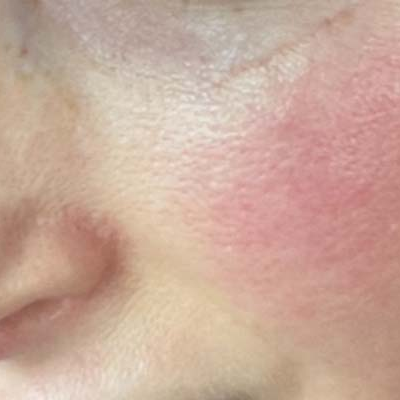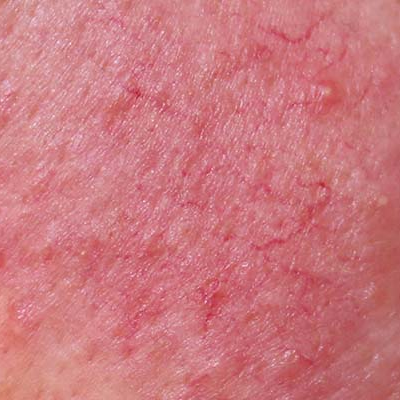*AMPERNA® products are cosmetic only and not intended to treat, cure or prevent any disease or skin condition. Always consult a healthcare professional for medical advice.


Rosacea
Rosacea is a fairly common skin condition that is most likely to affect fair skinned women. It’s typically diagnosed between the ages of 35-50, however the first signs of persistent facial flushing can appear from as early as the teenage years.
You’re no doubt aware that it can really affect both physical and mental wellbeing and can be triggered by some of our favourite food and drinks.
We know how challenging it can be going about your day-to-day tasks with painful and irritated facial skin.
WHAT CAUSES ROSACEA?
The cause of rosacea is not entirely understood. It’s believed that the disease is likely to be triggered by a combination of interacting factors, and that the number of factors can differ from one person to another.
According to an article on the the American Academy of Dermatology Association website, possible causes include a greater number Demodex mites than usual, a protein in the immune system called cathelicidin causing colour change and swelling, and bacterial infections.
SIGNS AND SYMPTOMS OF ROSACEA
For many people, the first signs of rosacea are redness on the cheeks, nose, chin or forehead that comes and goes.
Rosacea may also occur on the ears, scalp, chest or neck with redness becoming ruddier and more persistent over time. In some cases visible blood vessels may appear.
If left untreated, you may notice that pimples and bumps develop, and in severe cases the nose can become bumpy swollen from excess tissue. Called rhinophyma, this is how the late comedian W.C Fields ended up with his trademark bulbous nose!
Find out more about rhinophyma.
Do you sometimes notice that you have irritated eyes when you get a rosacea flare up? In some cases, the eyes are also affected, appearing bloodshot and watery.
Here is a list of most of the most common signs and symptoms of rosacea:
- Facial redness that won’t go away
- Frequent flushing or blushing (this is the earliest sign of the disorder)
- Pimples and bumps (they might look a bit like acne but they sometimes sting or burn)
- Visible blood vessels
Less common symptoms include:
- Raised red patches known as plaques
- Rough skin in the centre of the face
- Thickened skin, most commonly around the nose
- Facial swelling
- Irritations on the neck, scalp, ears or chest
- Eye irritation
- Burning or stinging sensations on the face
TYPES OF ROSACEA
There are four subtypes of rosacea, including
Erythematotelangiectatic rosacea: Symptoms can include redness, flushing and visible blood vessels.
Papulopustular rosacea: This type can present as redness, swelling, and break-outs that appear like acne.
Phymatous rosacea: The facial skin thickens and has a bumpy texture.
Ocular rosacea: Mostly affecting the eyes, which appear red and irritated. Eyelids can be swollen and appear to have a sty.
If you’re interested in seeing how these types of rosacea appear, you can view images on the National Rosacea Society website.
HOW IS ROSACEA DIAGNOSED?
There is no specific test for rosacea. Flushing is considered to be the first symptom and can be enough for a GP to give a diagnosis.
According to the Mayo Clinic, in some cases, doctors recommend tests to rule out other conditions that can cause symptoms similar to those of rosacea. Other conditions could include forms of acne, psoriasis, eczema or lupus.
It’s beneficial to seek help as soon as possible if you believe you might have rosacea, as earlier diagnosis is thought to help reduce its severity.
WHAT TRIGGERS ROSACEA?
Just as there are many different types of rosacea with differing symptoms, there are a wide variety of things that are believed to set it off.
A survey of rosacea patients conducted by the National Rosacea Society identified the following triggers:
- Sun exposure
- Emotional stress
- Hot weather
- Wind
- Heavy exercise
- Alcohol consumption
- Hot baths
- Cold weather
- Spicy foods
- Humidity
- Indoor heat
- Certain skin care products
Some studies have reported that drinking coffee and eating hot meals were also triggers. However, new international research published in the journal JAMA Dermatology, has found a link between consuming around four cups of caffeinated coffee every day and a decreased risk of rosacea.
Of all the triggers listed above, sun exposure affected the largest proportion of those surveyed (81%). That’s why many experts recommend that you layer on the sun protection if you are prone to rosacea.
IS THERE A CURE FOR ROSACEA?
Unfortunately, rosacea is a chronic disorder, which means that it often reappears even if it seems to have cleared up for a period of time. The good news is that it can often be controlled with modifications to lifestyle and/or medical therapy.
One thing that seems clear is that you should seek help as soon as you notice the first signs of rosacea.
‘Studies have shown that rosacea patients who continue therapy for the long term are less likely to experience a recurrence of symptoms.’ (Source: rosacea.org)
WHAT ARE THE BEST TREATMENTS FOR ROSACEA?
Every case of rosacea is different and what works for one person may not work for another.
As so many patients report sun exposure as a trigger, healthcare professionals put emphasis on the daily use of an appropriate maximum protection sunscreen.
For information on appropriate sunscreens see this article on the Rosacea Treatment Clinic website.
Each patient will require different treatments depending on the symptoms and type of rosacea they are experiencing.
Treatments include prescription medications such as topical or oral antibiotics. Laser and light treatments, microdermabrasion and glycolic acid treatments are also offered. AMPERNA® products offer rosacea sufferers a more natural way to help their symptoms.
Your GP or dermatologist will be able to recommend the right treatment for you.
THINGS THAT PEOPLE HAVE FOUND HELPFUL IN TERMS OF LIFESTYLE CHANGES INCLUDE
- Avoiding the triggers listed above
- Protecting their face from the sun with a high SPF sunscreen
- Avoiding skincare products that contain alcohol or other reported irritants such as witch hazel, fragrance, menthol, peppermint and eucalyptus oil (Source:rosacea.org)
- Treating the skin gently
- Eating for your skin concerns; a rosacea diet full of anti-inflammatory foods may help ease your flare-ups. You can read our blog post Could an Anti-Inflammatory Diet be the First Step to Clearer Skin?
SKIN CARE INGREDIENTS TO AVOID FOR ROSACEA
If you have rosacea you should avoid drying ingredients like:
- Alcohol
- Witch hazel
- Menthol
- Camphor
- Peppermint
- Eucalyptus oil
- Man made fragrances
- Propylene glycol.
